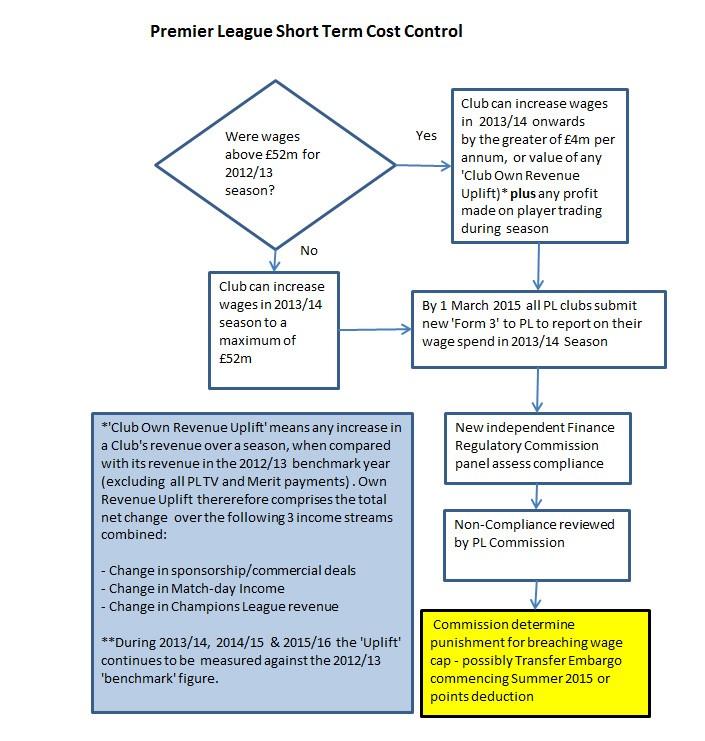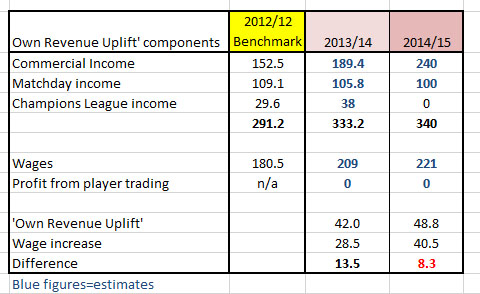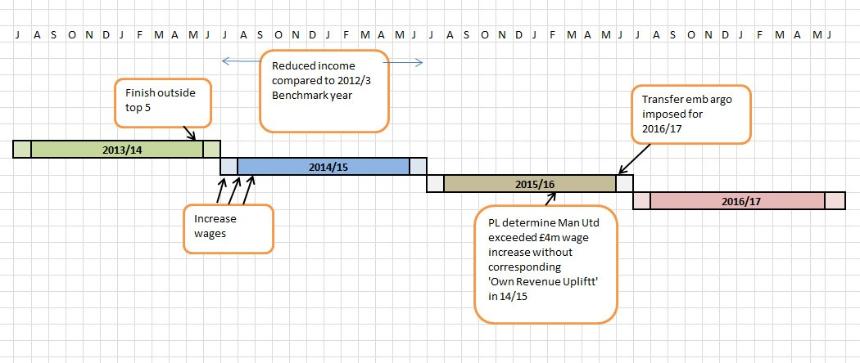Manchester United unable to spend their way out of trouble
In December Martyn Ziegler wrote an interesting piece outlining the financial implications for Manchester United if they don’t secure a Champions League place at the end of the current 2013/14 season. As Ziegler pointed out, the club’s CL income will be reduced next season by around £35m, with the club missing out on a further £10m in gate-receipts.
Given this probable fall in income, it is interesting to overlay the new Premier League spending constraints and see what impact this fairly dramatic income reduction will have on the club. The results are rather startling – the club appear to have considerably less leeway to spend their way out of trouble than club vice-chairman would have us believe. Even with the extra commercial income from the forthcoming renewal of the Nike deal, United will note be able to increase wages without constraint. Indeed, if the Nike deal were not to take place, a material increase their wage bill they could even have resulted in a transfer embargo (or even a points deduction) which would be applied during the 2015/16 season.
The ‘transfer-ban’ would have occurred with only a small set of assumptions:- Finish outside the top 5 this season
- Heavy spend on new recruits in the summer 2014, pushing up the wage-bill
- Little significant profit from selling departing players in the summer 2014
- The lost CL revenue is not wholly replaced by new commercial deals in 2014/15 (here the Nike deal is crucial)
The new Premier League spending constraint rules prevents clubs increasing their wage bill by more than £4m a season unless it can fund any increase by an uplift in its commercial income. Although the punishment for breaching the wage-cap rule has not been published, we do know that a transfer embargoes and, probably a points deduction, will be applied to heavy loss-making clubs. The new rules were introduced following pressure from the government** and it seems entirely likely that a club that breaches the wage-cap rule will also result a transfer ban.
The rules that restrict wage increases came in this season and work as follows:

For Manchester United, the devil is in the detail: the new PL Rules allow Manchester United to increase their wage spend by more than £4m a season only they generate a corresponding ‘Uplift’ in their ‘Own Revenue’. Any ‘Uplift’ is measured from the season of 2012/13 which acts as the benchmark against which changes in wages and income are judged. Crucially, all payments from the ‘Central Fund’ (mainly derived from Sky/BT TV payments) are excluded from the calculation of ‘Own Revenue Uplift’. However, Champions League TV revenue income and Match-Day income are included in ‘Club Own Revenue Uplift’ calculations. So a big drop in Champions League and Match-day income (as is likely to happen to Manchester United) will restrict a club’s ability to increase their wage bill.
Manchester United recently released their half-yearly figures and we can use these to understand where they are likely to be at the end of the current year:

The 2013/14 figures are extrapolated from the recently published accounts – the 2014/15 are estimates. The Own Revenue Uplift figures are calculated against the 2012/13 benchmark season (as required by the PL rules). The Commercial income for 2014/15 assumes a £30m Nike uplift plus £20m of additional Commercial deals. If events occur as per the above scenario, Man Utd would fail the spending constraint rules in 2014/15 if wages increase to more than £221m. To put that into perspective, that appears to be only about £12m above their current level (and Manchester City spent £233m on wages last season). The fact that Manchester United would probably receive a transfer ban if they matched their city rivals for wage spend must be rather irksome to Manchester Utd fans. Man Utd may be able to spend money on transfer fees, they do have a very real restriction on their ability to increase wages.
Clearly, if they can generate significantly higher Commercial income figure, the problem is alleviated. However, achieving a Commercial uplift of more than £20-30m in a season when they are outside the Champions League might be a tough task (assuming the sale of stadium naming rights is still off the table).
The other key figure to note is the ‘Profit from player trading’ figure. I have assumed that Manchester United don’t make a profit from player trading in the coming summer (they have a number of players that they would probably prefer to lose who may have to be sold at a loss). Whereas a loss on player trading doesn’t impact the ability to increase wages, the rules allow a club to increase their wages if they can make a profit. This might have a direct bearing on players such as Rooney, who are on a low book-value in the club accounts and who could be sold for a significant paper profit.
Matters could be alleviated if the club gain a Europa League slot (which usually generates c £8m plus gate receipts for a club like Man United. However, at the moment even that might well not be achieved). Although it is probably unlikely that Man Utd would choose to overspend and thereby head for a transfer embargo, the embargo timeline works as follows:

Comparatively few of the big-name players have contracts that end this summer and which aren’t being extended (only Evra and Ferdinand look likely to leave, plus Fabio, Macheda and Lingard). In an ideal world, Man Utd would have wanted more wages freed-up to reallocate to new players. However every player leaving who is on a high wage-bill will free up wages for new players.
For Manchester United, a material drop in CL income combined with the need to spend heavily to rebuild the team, does not sit happily with the new Premier League’s new rules. Unfortunately for Moyes, the club simply cannot increase wages without giving consideration being to the timing of a much-needed restructure. The new rules represent a sea-change - the days when one of the richest Premier League teams could simply buy their way out of trouble, without a glance over their shoulder, have gone.
blog comments powered by Disqus
